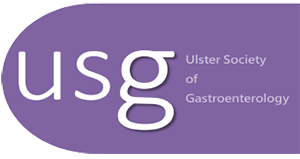Clarifying the referral pathways for patients diagnosed with gastrointestinal cancer: is the ‘Red-Flag’ pathway working?
Authors
Eccles JK, Lynch PMDepartments / Institutions
Antrim Area Hospital, Northern Health & Social Care TrustPublication Date
Spring 2014Introduction
Although the ‘Red-Flag’ referral pathway facilitates appropriate primary care referrals for suspected cancers, gastrointestinal (GI) cancers are often diagnosed through ‘routine’ referrals, emergency presentations, and the bowel cancer screening (BCS) programme. We sampled 107 GI cancers diagnosed within our trust between April 2011-December 2012 (56 lower and 51 upper GI cancers), determining referral source and grade, whether patients had red-flag criteria, and outcomes (curative or palliative). 58 GI cancer patients (54%) had been referred via GP (22% seen initially at clinic, 32% at direct access endoscopy), 5 (5%) were referred by another physician, 28 (26%) attended through casualty, 10 were diagnosed through the BCS programme (9%), 5 (5%) through Barrett’s surveillance, and 1 colorectal cancer (1%) through polyp surveillance. All 27 lower GI cancer patients originally referred by GP had ‘red-flag’ symptoms, but only 12 (44%) had been referred as ‘red-flag’; of 17 that underwent curative treatment, only 7 were originally referred as ‘red-flag’. All 10 BCS patients and 6 casualty self-presenters underwent curative treatment. Similarly, all 31 upper GI cancer patients originally referred via GP had ‘red-flag’ symptoms, but only 15 (48%) were initially referred as ‘red-flag’; of 11 curative cases, only 5 had been initially referred as ‘red-flag’. Of the 54 total palliative cases, only 15 of the 30 GP referrals were referred as ‘red-flag’. All GI cancers originally referred from primary care satisfied ‘red-flag’ criteria, yet less than half were referred through the ‘red-flag’ pathway, emphasising the need for education and reinforcement of the ‘red-flag’ referral criteria.
Latest News
Gastroenterology FK Meeting Provision and Challenges
Posted on: 2nd April 2021Latest Event
There are no up-coming events.E-Publications
Download our latest Documents


